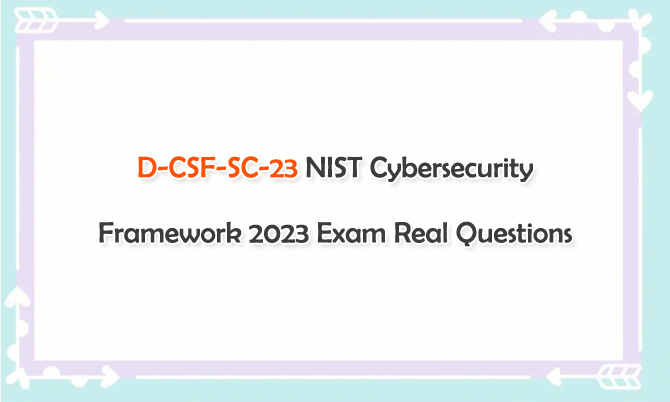The D-CSF-SC-23 NIST Cybersecurity Framework certification is a crucial credential for professionals aiming to showcase their proficiency in implementing the NIST framework's components. This framework plays a pivotal role in elevating cybersecurity practices within data centers, making it an indispensable skill set in our increasingly interconnected digital landscape. All the related NIST Cybersecurity Framework 2023 D-CSF-SC-23 exam information is helpful in your preparation.
NIST Cybersecurity Framework 2023 Exam
The D-CSF-SC-23 exam is a comprehensive evaluation that assesses your comprehension of NIST's Cybersecurity Framework Version 1.1. It encompasses both overarching framework concepts and the intricate underlying processes that underpin its execution. The examination delves into the framework's core, tiers, and profiles, empowering professionals - especially those within the Computer Security Incident Response Team (CSIRT) - to gauge risks and prioritize cybersecurity measures in accordance with evolving business demands and security landscapes.
D-CSF-SC-23 Exam Structure and Key Topics
The D-CSF-SC-23 exam consists of around 60 questions to be answered within a 90-minute timeframe. To secure certification, candidates must achieve a minimum score of 63%. Below, we outline the core subject areas candidates can expect to encounter:
1. NIST Framework Overview (10%)
- Provide an elucidation of the NIST Framework's architecture and its underlying purpose, encompassing the Core, Tiers, and Profiles.
- Elaborate on the topics affiliated with the Category layer and their alignment with NIST Framework functions.
2. NIST Framework: Identify Function (18%)
- Define what constitutes an asset and delineate which assets necessitate protection.
- Expound upon the elements of a continually updated inventory ("who/what/why") and its role in facilitating planning for Disaster Recovery, Incident Response, Communications, and Business Impact Analysis.
- Articulate controls for inventory classification and expound on the Key Performance Indicators (KPIs) associated with these controls.
3. NIST Framework: Protect Function (23%)
- Emphasize the significance of creating and documenting a baseline configuration.
- Clarify the integral role of Business Impact Analysis in the protect function.
- Describe the pivotal role of the Business Continuity Plan and Business Impact Analysis.
- Detail the controls for maintenance and access control subcategories in the protect function.
- Discuss awareness training, data security, and protective technology subcategory controls.
4. NIST Framework: Detect Function (17%)
- Analyze the intricate details of a breach, encompassing its definition, causative factors, preventive measures, and mitigation strategies.
- Identify viable methods of detection and expound on their implementational aspects.
- Illuminate the concept and advantages of continuous monitoring.
- Identify and elucidate subcategories associated with detection and analysis.
5. NIST Framework: Respond Function (17%)
- Describe the method for quantifying the extent of a security breach.
- Explain the steps to effectively contain a security breach.
- Master the construction of a robust Incident Response Plan.
- Elaborate on the purpose and components of a comprehensive Communications Plan.
- Detail the post-incident review process.
6. NIST Framework: Recover Function (15%)
- Determine and articulate considerations when implementing a Disaster Recovery Plan (DRP).
- Describe how the Business Continuity Plan (BCP) expedites a timely recovery to normal operations following a cybersecurity incident.
- Assess and articulate the requisites and processes for returning to "business as usual."
- Elaborate on the process of comprehending the impact on the business, including repercussions on reputation and revenue.
NIST Cybersecurity Framework 2023 D-CSF-SC-23 Real Exam Questions
The NIST Cybersecurity Framework 2023 D-CSF-SC-23 real exam questions refer to a set of examination questions related to the NIST Cybersecurity Framework version 2023, specifically focusing on the D-CSF-SC-23 control. These exam questions aim to evaluate an individual's understanding and knowledge of the cybersecurity practices and controls outlined in the framework. By testing candidates on their comprehension of D-CSF-SC-23, the exam ensures that they possess the necessary skills to implement and maintain effective cybersecurity measures in accordance with the NIST Cybersecurity Framework. This examination plays a crucial role in assessing an individual's proficiency in addressing cybersecurity challenges and demonstrates their ability to safeguard critical systems and information against cyber threats.
The D-CSF-SC-23 NIST Cybersecurity Framework 2023 exam represents a thorough assessment of your comprehension and proficiency in implementing NIST's cybersecurity framework. By gaining a comprehensive understanding of the key topics and their associated weightings, you can better prepare for this crucial examination. Earning this certification not only validates your expertise but also demonstrates your capacity to elevate cybersecurity practices - a paramount skill in today's digital landscape. We wish you the best in your exam preparations, and remember that a firm grasp of these topics will undoubtedly be an asset in your cybersecurity career.
